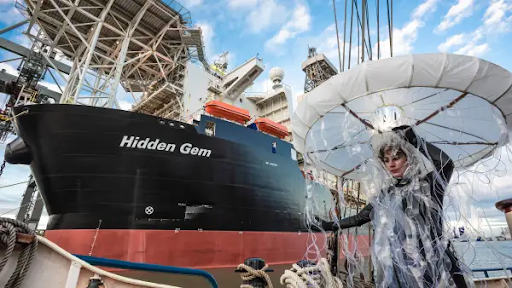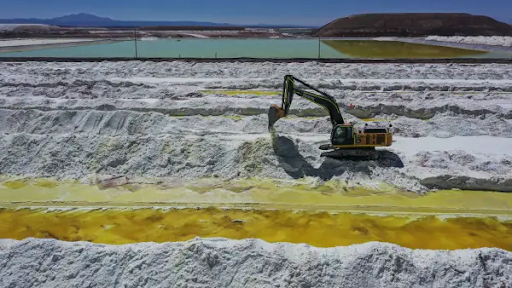
Chinese Lenders and the Challenge of Insufficient Lending | BizBlog News Chinese Lenders Face a Significant Challenge : They Are...

Norway’s decision to stop deep-sea mining has sent shock waves across the world on the environmental front . This decision marks a great milestone for those who fight to protect marine ecosystems, as well as climate change activists. Long debated, the issue of deep-sea mining has created heated arguments from proponents of extraction of resources and warnings about ecological disaster . A cautious choice was made by Norway-a country closely tied to its natural landscapes and marine heritage-by putting the environment before short-term gains .
Deep-sea mining is the new frontier in resource extraction. It involves mining the ocean floor for rare metals such as cobalt , nickel , and manganese, all essential components for green technologies such as batteries for electric vehicles . These resources are said to be crucial for the advancement of clean energy and reduction of carbon emissions . However, environmental costs cannot be ignored. The ocean floor is a delicate ecosystem , harboring a variety of species that remain undiscovered. Mining may destroy habitats , release toxins , and increase biodiversity loss .
The stand by Norway mirrors worldwide concerns about whether the economic gains outweigh the environmental threats. In stopping these plans, the country has brought up debates as to whether environmental integrity must supplant industrial progress .
The world’s largest marine ecosystem stretches across Arctic and sub Arctic waters , which can be found in Norway . These water bodies are important not just for global biodiversity but as buffers against climate change , and so they act as carbon sinks . The seabed is rich with unique organisms, some of which assist in biomedical research and pharmaceutical development. In doing this, the conservation of the marine habitats will support global actions to reduce the impacts of climate change and maintain ecological balances .
Due to deep-set cultural and economic dependencies with the sea, the action on Norway’s side helps reaffirm a stewardship over the healthy ocean . Thus, ceasing mining practices may result in no damage or risk from extraction to critical marine ecosystems where biodiversities rely alongside other socio-economic livelihoods associated with fishing industries or aqua tourism .
While Norway ‘s decision is indeed commendable , it is being done in isolation . Environmental concerns have been raised by environmentally conscious people around the globe regarding the environmental implications of mining activities . Organizations such as Greenpeace and the Deep Sea Conservation Coalition have voiced their concerns , urging a halt to deep-sea mining until the environmental results are well understood .
The ISA , which is responsible for governing deep-sea mining regulations , has been criticized for having too lenient environmental protocols . The Norway halt could motivate other countries to reconsider their mining approaches and push for tougher international standards .
A major reason the Norwegians have taken a firm no is due to a lack of wide ranging scientific data on the deep-sea impact of mining. Scientists have continually pointed out that no one knows what would happen when the ocean floor is disturbed . If the seabed can ever recover from such disruptions , then that may take centuries , leaving a permanent scar on the environment .
By prioritizing scientific research over premature industrial activity , Norway emphasizes the need for evidence-based policymaking. This cautious approach ensures that decisions are aligned with sustainable development principles .
Norway’s decision to end deep-sea mining solidifies its reputation for being a leader in ecological preservation . Already famous for progressive policies on renewable energies and carbon neutrality , that will add another layer in green credentials . As countries balance between development and sustainability Norway has shown the way as far as prioritizing ecological well being is concerned .
This move could also enhance Norway ‘s influence in international negotiations on marine conservation . By standing up , it puts itself in a position to be an advocate for ocean health , inspiring other countries to do the same .
Public opinion has greatly influenced Norway’s decision . Activists , scientists , and local communities have continued to raise concerns over deep-sea mining. Protests and petitions have been made in relation to the need for transparency and accountability in the decision making process .
Strong grassroots opposition reflects a broader global trend where citizens demand environmentally responsible governance . Norway ‘s response to these concerns is the power of collective action in shaping policies .

Chinese Lenders and the Challenge of Insufficient Lending | BizBlog News Chinese Lenders Face a Significant Challenge : They Are...

Nvidia Sees Surge in Retail Investor Interest | AI Powerhouse | Bizblog News Nvidia Experiences a ‘Remarkable’ Surge in Retail...

White Gold: Key to South America Trade Agreement | BizBlog News White Gold: The Cornerstone of Europe’s Trade Agreement with...

Google AI Model Release : The Next Stage in Google’s Virtual Agent Push Google has taken a bold step in...

Ferrari earnings growth 2025 Shares Pop 8% as Luxury Carmaker Sees Further Earnings Growth Ferrari earnings growth 2025 , the...

How China’s DeepSeek Benefits for India: A New Era of Technological Synergy China’s advanced technological solutions, like DeepSeek, have been...